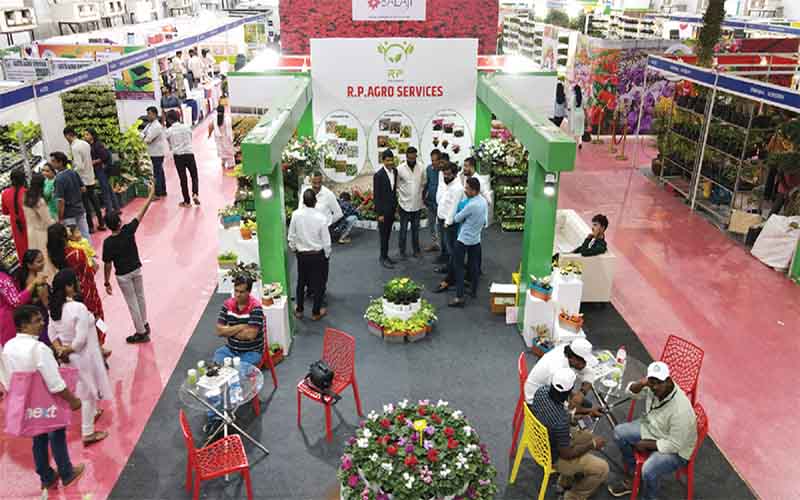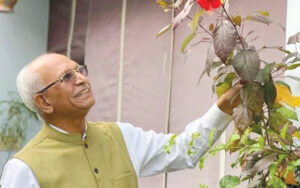HortiProIndia 2023: Unforgettable Journey
YP Singh
Editor, Nursery Today
Horticulture is a gift of nature to human beings which always takes him closer to nature. So, it is true that humans are deeply bound to nature and explores, consume it extensively. In this sense, horticulture is an internal exploration of life. In today’s rapidly evolving world, sustainable agriculture is a key focus for industries across the globe. One crucial aspect of sustainable agriculture is horticulture which is vital in food production, environmental conservation, and economic growth. I mean, Horticulture is an important branch of agriculture that deals with the cultivation of plants and vegetables for food, medicine, and other uses. It includes everything from growing flowers and vegetables in a backyard garden to raising crops in large-scale operations. Horticulture involves the study of plants, their growth and development, and how they interact with the environment. Horticulture is a unique field of study, as it combines elements of botany, agronomy, soil science, and other aspects of plant biology. The main goal of horticulture is to ensure the production of high-quality, nutritious, and aesthetically pleasing plants, fruits, and vegetables. From time to time, efforts are made to promote horticulture in different parts of the country. Along with the state governments, the central government is also making a lot of efforts for its betterment. Many private organizations have also done and are doing excellent work in this direction.

Horticulture plays a crucial role in environmental conservation by promoting practices that minimise the negative impact of agriculture on ecosystems. Farmers can reduce water usage, minimise chemical inputs, and encourage biodiversity by adopting sustainable horticultural techniques. These practices help preserve soil health, protect natural habitats, and mitigate the effects of climate change. The horticulture industry contributes significantly to the economy, generating employment opportunities and fostering rural development. In a developing country like India alone, the horticulture sector is valued at billions of dollars and supports thousands of jobs. By investing in horticultural practices, countries can stimulate economic growth while ensuring food security and reducing dependence on imports. Horticulture ensures nutritional security by providing a diverse range of fruits and vegetables. These crops are rich in essential vitamins, minerals, and antioxidants, promoting a healthy and balanced diet. By prioritizing horticultural production, India can reduce the risk of malnutrition and
improve public health outcomes.
In other words, the private sector plays a significant role in the advancement of horticulture in India. Private companies invest in the research and development, technology adoption, and supply chain management to improve productivity and quality in horticultural practices. They often collaborate with farmers to introduce modern farming techniques, crop protection measures, and innovative cultivation methods. Private entities involved in horticulture can range from Agribusiness Corporation to seed companies, agrochemical manufacturers, and food processing units. Their contributions extend to developing high-yield varieties, providing market linkages for farmers, and implementing sustainable practices. This collaboration between the private sector and farmers is essential for the growth of the horticulture industry, fostering innovation and contributing to economic development in the agricultural sector.

In this context, the work being done by Maharashtra Nurserymen’s Association is commendable and excellent. This organization has been striving for improvement and development in the field of horticulture for the last many years. ‘HortiProIndia 2023’ is one such unique effort which is stepping towards a great revolution in this direction. As we know, HortiProIndia 2023 is an international exhibition and conference focusing on modern agriculture, horticulture, floriculture, agriprenurship, and its processing employing cutting-edge technology, as well as best practices that may benefit countless farmers and platform owners. It was held in Agriculture College Ground Pune on 23 to 26 November 2023 showing the companies news of India and internationals related to sectors Agriculture, Horticulture, Flowers. This initiative was launched by the Maharashtra Nurserymen’s Association in partnership with the Association of Environmental Horticulture and Vasu Events and Hospitality. The event did feature a wide range of plants and gardening advancements. Horticulture professionals and farmers from India and other countries were present and increased the knowledge of the presented people. In an intensified sense, Horticulture is the science and art of growing plants and HortiProindia is the best place to find out more information about horticulture, including the latest tools, techniques, and methods.
In today’s world, horticulture is a booming industry. Landscape design and nursery management are also becoming more popular as people seek to make their homes more beautiful and functional. However, one of the most important aspects of this field is water management. Water management system can be crucial for maintaining the health of plants, trees, and other living things in your garden. The exhibition presented a wide range of captivating features, such as flowers, fruit and vegetable plants, medicinal and ornamental plants, international flowers, hydroponics, solar energy technology, plant technology, biotechnology, greenhouse technology, and automation. It serves as a platform to showcase the latest advancements in gardening and will attract farmers from both India and abroad. Additionally, horticulture experts were available to offer valuable guidance to farmers and professionals. This event creates abundant employment and business prospects within the horticulture sector.

HortiProIndia 23 serves as a comprehensive platform uniting various sectors within horticulture. This exclusive event brings together stakeholders from plant nurseries, landscape, allied industries, and greenhouse experts, fostering collaboration for better deals. With over 200 exhibitors, it emphasizes quality infrastructure to convey a clear message to customers. The platform engages in discussing the current state of Indian horticulture, sharing industry insights, and exploring new trends through interactive sessions. The primary objective is to connect top experts in horticulture, facilitating knowledge exchange on innovative technologies. The grassroots-level event has now grown into a national level initiative. HortiProIndia 23 addresses challenges and opportunities, showcasing learning outcomes from national and global experts, sharing success stories, and debating best practices. It prioritizes customer-centric initiatives, enabling effective connectivity between customers and suppliers through stand-up sessions, public forums, and buyer meet-ups.
The event offers a range of activities, workshops, and technical sessions designed to educate the industry on the latest horticulture trends. Starting its journey in Pune, it features over 200 exhibitors and approximately 2,500 exhibits covering cultivation machinery, horticulture machinery, plant varieties, and more. The open 4-day B2B platform is organized by Vasu Events in association with the Association of Environmental Horticulture. As challenges in horticulture increase with growing participation, opportunities abound for those aspiring to succeed on a larger scale. The horticulture industry, with strong linkages, can stimulate sustained growth. It encompasses the production, cultivation, and trade of plants, shrubs, seedlings, bulbs, and high-end products like flowers, vegetables, fruits, and herbs. This industry not only generates income but also provides jobs for the rural poor, transforming village-based growers into robust market suppliers in local and international markets.
In this program, many renowned speakers drew attention to various aspects of horticulture. MLA Ashok Pawar laid great emphasis on the utility of the scheduled function and said that the presence of a large number of farmers here is proving its success in itself. He drew attention to the negative environmental impact of plastic flowers used in festivals and suggested a ban similar to the government’s restrictions on plastic. Some share their expertise about Secret of Successful Hydroponic Farm, Nutrient Management for Ornamental Nurseries, Climate resilient protected cultivation technologies for Indian agriculture and Smart Farming with automation systems. This conference greets a meet-up for professionals in the horticulture, nursery, and landscape industries who are interested in the latest trends and technology of the sector.
Mr. Mahesh Damodare, a post graduate engineer from Stanford University, emphasized how to introduce many innovative technologies in Plants Nutrition like Slow and Controlled Release Fertilizers along with innovative Microbial and Nano Tech Products for Plant Protection. He said that Nutrient Management is a basic tool to maintain and survive any kind of plant. It is an initial way to know about plant nutrition, nutrient deficiency in ornamentals, challenges in plant nutrition’s criteria, smart nutrition, stage wise requirement, nursery issues and innovative solutions. Mr. Rajendra Kumar, an accomplished and award winning professional who has vast experience in farming business with sound project planning, management and execution of agriculture projects for sustainable agriculture development, affirms to strengthen the organization with cross-functional experience in controlled environment agriculture and latest agriculture technologies to create profitable farm business ventures. He said, “Implementing climate-resilient protected cultivation technologies in Indian agriculture enhances crop yield and quality by providing a controlled environment. These methods, such as polyhouse farming and shade net cultivation, mitigate the impact of climate change, ensuring sustainable and efficient crop production in diverse weather conditions.”

Mr. Bharat Shripati Bhojane has focused on Hydroponics systems in the domain of agriculture, plant propagation, and tissue culture. He said Hydroponics is the technique of growing plants using a water-based nutrient solution rather than soil, and can include an aggregate substrate of growing media, such as vermiculite, coconut coir, or perlite. Hydroponic production systems are used by small farmers, hobbyists and commercial enterprises. Great expertise Mr. Sharad Patil was taught about how to work Smart farming with automation systems. He is proficient in Agrochemicals and pest Management and has long experience in agronomy consultancy in high-value Horticulture crops, green-house technology, furtigation, and Irrigation. He focused on how India will become a 100% make-in-india automatic irrigation Fertigation & Wireless Project System which brings a green revolution to the Agriculture Industry.
However, recognizing the significance of horticulture in sustainable agriculture, governments worldwide are implementing measures to support and promote the industry. Time-to-time government of India has announced a support package of measures to boost the country’s farmers and encourage consumers to “buy Indian.” These measures include industry-led campaigns to promote Indian produce, support for sustainable farming practices, and the appointment of agri-food attaches to expand trading markets. Additionally, the government is investing in improving small abattoirs to facilitate local and international market access for farmers. The Small Abattoir Fund aims to enhance productivity, animal welfare, and the adoption of new technologies. These initiatives benefit farmers and contribute to the overall sustainability and resilience of the horticulture industry.
The National Horticulture Board (NHB) focuses on promoting the development of horticulture. It provides financial assistance and support for a range of horticulture activities, including production, processing, and marketing. NHB plays a vital role in implementing and coordinating various horticulture schemes and projects. It aims to enhance the production and productivity of horticulture crops, improve post-harvest management, and facilitate the marketing of horticulture produce. Agricultural Processed Food Products Export Development Authority (APEDA) is doing a good job. APEDA’s primary focus is on promoting the export of agriculture and processed food products, including various horticulture commodities. Similarly, The National Bank for Agriculture and Rural Development is primarily focused on funding for the development of horticulture infrastructure, adoption of modern technologies, and promoting sustainable agricultural practices.
While horticulture offers numerous benefits, it has its challenges. The nature of horticulture and the effect of short-term events, such as weather fluctuations, can create volatility in production. The global supply chain has also faced disruptions due to various factors, including the ongoing pandemic. Despite these challenges, the horticulture industry presents several opportunities for growth and innovation. Horticulture is crucial in sustainable agriculture, offering solutions to environmental, economic, and nutritional challenges. By prioritising horticultural practices, countries can conserve natural resources, stimulate economic growth, and enhance food security. The support of governments and the increasing consumer demand for sustainable produce further reinforce the importance of horticulture in creating a more sustainable and resilient future. Horticulture has a vast scope and is essential for meeting the growing demand for food, ornamental plants, and other related products. Horticulture plays a crucial role in providing nutritious food, beautifying the environment, and enhancing the quality of life.

















